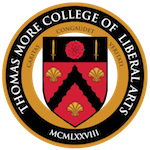By Peter Rao ’24
On the evening of December 13, the Thomas More College Choir held its first performance of the year, an Advent concert, at St. Marie’s Church in Manchester, NH. Led by Director Joel Marshall ’24, the choir, which had been preparing for this event throughout the semester, presented a series of seasonal carols and chants, including an original composition by Mr. Marshall titled “Aspiciens a Longe.” The music was interspersed with several Advent-themed works of prose and poetry by authors such as C.S. Lewis, T.S. Eliot, and Robert Frost.
Chorister Mary Ingrid Schnake ’26 shared her thoughts about the choir and expressed her gratitude for being able to participate. “It’s a really good and beautiful thing to learn how to sing sacred music,” she said. “I joined because I wanted to learn more about sacred music as a whole and to become a well-rounded student.” Miss Schnake also stated that she was happy to be part of a concert “performed for the joy of the people listening and for the betterment of the culture.” She continued, “I had never done anything like the concert before. It was good to share something beautiful with other people, and Joel was a fantastic director. It was rewarding to work with someone who acknowledged your hard work and had overwhelming gratitude for you and for all the effort you put in.”

Following the concert, Mr. Marshall sat down to share his thoughts about the nature of the choir, the style of the performance, and the months of preparation leading up to it.
Could you speak a little about the process and effort that went into producing this concert?
A large part of what goes into producing a concert like this is the logistical, practical side of it. The most visible thing, getting up and performing the music, is one of the easier parts. It’s figuring out how to manage a group and how to keep the whole process rolling along that’s difficult. On the flip side, contrary to what you might expect, sometimes that part is more fun than when you’re performing or in rehearsals. We owe a huge debt to all the people in the choir who took time to help with publicity, who were involved in branding the choir, marketing it, and who put a large amount of trust into something that’s still a new institution.
I would say that, most of all, I’m happiest that people were able to glean something of the vision I had for the choir. At the end of the first year that the choir existed, it was a huge accomplishment to simply perform one motet that I had written for a professor. In both semesters last year, we were able to produce two concerts—the Advent Concert and the Easter Concert. Both were successful, but the goal then was to be able to present them [to the College community]. This year, the goal was to take it to the public and to have something that any audience, regardless of their association with the College, would want to listen to. Given the feedback that I’ve received from the audience, from the choristers, how I felt about it, and what I’ve heard of the recordings so far, I think that we’ve reached a level that would merit the degree of trust that we’re looking for.

Could you say something about the substance and style of the concert and why you chose the music and readings that you did?
All three of our concerts have been loosely based on the carols and lessons format, which is popular in both the Anglican and Roman Catholic churches, but I think is more associated with the Anglican tradition. It consists of eight readings and eight pieces of music and is normally done in a liturgical context, but it still has this quality of stream of consciousness. I wanted to adapt that to a concert format and make it our own—that is, we’re not Anglican, we’re Catholic, we’re not English, we’re American—and to do that, you have to emphasize the stream of consciousness.
To use an example, there is a kind of mystical reference in T.S. Eliot’s poem “East Coker” to the idea of waiting for something in Advent that you’re not entirely sure of. The theme is one where, in this time of the year, there’s an experience of certain tensions being resolved. There’s something awaited, and we don’t quite know what it is. There are misunderstandings and misgivings, but there’s a promise of something, which is not quite articulated yet because we’re not quite at Christmas. Another example would be having Robert Frost’s poem “Stopping By Woods on A Snowy Evening” recited right before we sing “In the Bleak Midwinter.” There’s something suggestive about a journey that’s not entirely pleasant—that you’re reaching for something, and it’s worth it, but there are miles yet to go.
The Thomas More College Choir will resume rehearsals after Christmas break to prepare for their Easter concert during the Spring semester. These comments have been edited for length and clarity.
For further reading:
